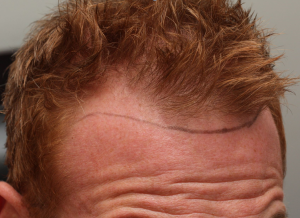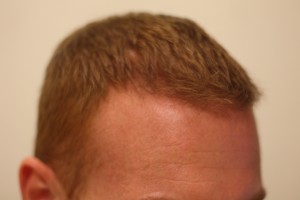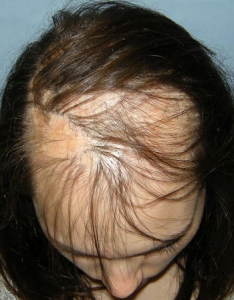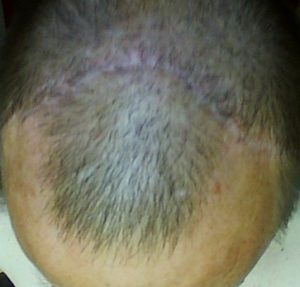Hanna was born 15 weeks premature and given only a five percent chance to live. The difficult birth resulted in severe bruising on her head and lead to lifelong scarring that destroyed the hair follicles on her scalp.
Hanna knew from a young age that her hair loss made her different. From being called a “monster” by classmates, to getting dollars from complete strangers in restaurants who assumed she was battling cancer, Hanna’s hair loss drew unwanted attention wherever she went. On the first day of kindergarten, Hanna told her classmates “Don’t look at my head, look at my heart. I will be good to you, you be good to me.”
Despite being turned down by their insurance company twice, Hanna’s family was determined to find a way to correct her appearance. They learned of the International Society of Hair Restoration Surgery’s Operation Restore program. Operation Restore is a pro bono program designed to match prospective hair restoration patients suffering from hair loss, as a result of an accident, trauma or disease, with a physician willing to help those who lack the resources to obtain treatment on their own.
Hanna was matched with Dr. Bill Parsley. He performed three surgeries over three years at no cost. These procedures restored Hanna’s hair, which in turn, restored her self-esteem.
Taking Finasteride should be a lifetime commitment. If you stop it at any time, you will lose all the hair you regained and lose any hair you would have lost without the drug. Too many patients try this and then come to me crying that they lost all of their hair.
Let’s say one has been going strong on Finasteride for a couple years now and he experienced a great amount of regrowth. Let’s also say that a new treatment for MPB has been found, proven to be better than Finasteride. Would it not be recommended to stop using Finasteride for the new treatment since they will be losing the hair they regained?
As there is no such treatment available, it would be impossible for me to say what would happen under such circumstances. That would, of course, depend upon the treatment itself. The question that needs to be asked and answered is this: Does the “yet to be discovered” new treatment address the miniaturized hairs as Finasteride does or does it just grow new hairs from the quiescent hair cells that we know are there but inactive?
Environment and behavioral issues do play a role in genetic balding. We call these epigenetic factors and we can see them when identical twins are separated and show different degrees of balding. I had a pair of identical twins, one twin had a hair system the other did not. The one who wore the hair system had advanced balding but the other one did not (only early Class 3 pattern of balding). So you can see in this example who an action taken by one twin altered his balding pattern for the worse (hair systems tend to accelerate hair loss). Stress, is also another such environmental factor that I see all of the time. As a young man comes up to his final exams in school, his hair loss often rapidly increases. Diet is still another factor that is not well understood, but we do see people who live in cold climates and not take Vitamin E supplements, develop a Vitamin D deficiency which can cause hair loss. I can write a book on this, but not hear please.
This question and answer is taken from the College of Family Physicians of Canada and it accurately addresses the question.
QUESTION: A few women have asked me whether Finasteride, taken by their partners for male pattern baldness, will affect their pregnancies. The product monograph is very alarming: it sounds as if even handling the medication could cause harm, especially to a male fetus. Should a man stop taking Finasteride if his partner is planning pregnancy or is pregnant? What is the risk to the fetus if its mother accidentally handles crushed or broken tablets?
ANSWER: To date, there are no reports of adverse pregnancy outcomes among women exposed to Finasteride. Taking 1 mg of Finasteride daily did not have any clinically significant effect on men’s semen. Absorption through the skin while handling tablets is extremely unlikely to cause fetal exposure or harm. There is no reason to discontinue the drug. Motherisk is currently following up women who are pregnant or planning pregnancy and whose partners are taking Finasteride.
Publication: Finasteride. Does it affect spermatogenesis and pregnancy?
The Full Text of this article is available here: https://www.ncbi.nlm.nih.gov/pmc/articles/PMC2018472/pdf/11785276.pdf
Yes, we often see strong forelocks in family lines that stick around into old age. David Letterman has such a forelock which holds his minimally balding look. The forelock may have a completely different genetic code when it comes to balding.
The HAIRCHECK instrument measures hair bulk. Follicles that stop growing do not add to the hair bulk on your head. Everyone with genetic balding will show patterns of reduced hair bulk when this is measured. I answered this in past tense. If you are asking me about the future, I don’t have any way to predict it. If you have genetic balding, then it is almost a guarantee that you will see more and more of it as you get older. see photos here on use of HAIRCHECK instrument: https://baldingblog.com/2017/01/10/value-haircheck-bulk-measurements-two-patients-seen-today/
The answer to this question is NO. From the attached article here (Still No Giraffe) and a recent article in the Scientific American (June 2017), it is clear that our metabolic rate is relatively stable regardless of how much we exercise. The attached article has a scientist who followed a ‘primative bushman’ from Africa as he burned calories after he shot a giraffe with a poison dart and followed the giraffe for a few days on almost a constant run 12+ hours/day. He collected the bushman’s urine for the days he followed the giraffe. The bushman was fed a special type of water which was excreted in his urine indicating the calories he burned. He found out that the number of calories burned by this bushman was only about 10% above the calories burned by someone who sat at his desk all day. Our brains use the most calories we consume, following by our heart, our kidneys, out liver and our intestine. Our muscles are only responsible for about 10% of the calories we burn so if an average man burns 2680 calories per day and doubles his calorie burn from skeletal muscles (not really practical to do this), then he would bun only another 268 calories. That turned out to be a surprise for the researcher and the author who ran along side the bushman for a few days as he chased the giraffe. In the Scientific American this month (June 2017), another article focused on the number of calories burned by men or women and were shown to be relatively constant, regardless of the exercise program undertaken by either of them.
So you might ask, why exercise if you can’t lose weight? Why not just sit and watch TV all day and night? The answer is that exercise makes you healthier, lets you live longer and develop less diseases such as cancer, heart disease, stroke, diabetes and other diseases. The conclusion of both articles is that if you want to reduce weight, you must reduce your caloric intake. Sitting on a couch by the TV all day will just take all of what you eat (for example, eating just two small cookies per day can translate to a weight gain of one to three kilograms per year) all of which gets turned into fat. Of course, that is the problem in America today as 1/3rd of the population is obese (expected to be half of the US population by 2030) and about another 1/3rd may be overweight. Just like a car cruising at 50 miles per hour, if you overfeed it gasoline, it will overflow the tank (your body’s fat reserves here reflect that tank). There is no substitute for good eating and controlling your obsessive need to stuff foods into your mouth every-time you see a good ice cream cone or some extra BBQ ribs or a third hamburger with french fries until you feel stuffed. This type of obsessive eating increases your risk to dying with cancer, heart disease and stroke, especially if you don’t exercise. Add to that, Alzheimer’s disease, dementia and almost every disease we humans develop by being alive, and overeating leads us to an early grave.
“Although this project was started in an effort to understand how certain kinds of tumors form, we ended up learning why hair turns gray and discovering the identity of the cell that directly gives rise to hair,” said Lu Q. Le, MD, PhD, associate professor of dermatology with the Harold C. Simmons Comprehensive Cancer Center, UT Southwestern. “With this knowledge, we hope in the future to create a topical compound or to safely deliver the necessary gene to hair follicles to correct these cosmetic problems.”
There is a long path to this discovery and an actual drug. The full article is here: https://www.mdlinx.com/dermatology/article/861?utm_source=in-house&utm_medium=message&utm_campaign=in-the-news-may17-derm
I have a history of severe depression. Will finasteride harm me?
With a history of depression, you need to discuss taking finasteride with your doctor. There are potential side effects with people who have a history of severe depression so great caution should be exercised when taking this drug and a close supervision of your doctor is important. I have written a post on this subject here: https://baldingblog.com/2017/05/23/finasteride-can-increase-depression-increase-actions-self-harm/
I’m thinning, and i decided to shave it all off. A big thing for me is the fact that once its all shaved off, there are follicles everywhere and thus it looks like i shaved out of style and not necessity. My question can the hair follicles itself, as time goes on, stop regrowing?
Your pictures shows you are thinning a bit. Some people believe that if they shave it, it will grow back normally, not true. To find out how much hair has been lost, the HAIRCHECK instrument check will tell you (see: https://baldingblog.com/2017/01/10/value-haircheck-bulk-measurements-two-patients-seen-today/) . The hair will keep growing until such a point as your genetic hair loss (assuming that is what you have) advances to your family genetic inherited pattern. That takes time. Based upon the HAIRCHECK results, you may consider finasteride if there is hair loss confirmed and if you are under 30 years old when the drug works best.
I went to the dermatologist the other day and she diagnosed me with TE. I am 21 years old and male. She blamed it on stress, when in reality I’m not stressed. What I believe it’s from is the 5 month accutane course I finished up in October of 2016. I honestly didn’t notice much shedding, but I have a ton of hair, and it’s short too. My barber told me I had uneven hair growth in January. Since then I can feel/ seethe spots that I am in shedding in. To this day I’m still shedding. Is there something I should do about this? Is this normal? Should I just let time do it’s thing?
Accutane is known to produce hair loss and the effects can last ujp to a year after you stop the drug. Go back to your dermatologist.
I’m just a Phd in a different field but I usually work on stuff related to medical problems. You are therefore obviously better qualified to talk about this but here’s how I understand it. Please correct me if I’m wrong since this is a very fascinating topic to me and there’s no experts like you around where I live :-)
Your genes build a “backdoor” into your hair follicles by making them vulnerable to DHT. Slowly over your lifetime more and more follicles become vulnerable, depending on your individual genetic coding.
There’s then a war going on in your body: DHT attacks the follicles, slowly makes them smaller until they completely disappear. Two proven ways to tilt the odds into your favor:
- Finasteride works by decimating the enemy – it indirectly reduces the amount of DHT – less attackers for your hair – balding slows down.
- Minoxidil works by strengthening your follicles and giving them a better defense against the attacker (DHT) – attacks are less effective – balding slows down.
Effectively both slow the balding down, only that Finasteride is much more effective. If you’re serious about winning this battle you should try to take both but if you can’t take Finasteride for whatever reasons, not all is lost and minoxidil might at least give you a few more years with nice hair.
Here’s three studies I read:
- Olsen, Elise A., et al. “A randomized clinical trial of 5% topical minoxidil versus 2% topical minoxidil and placebo in the treatment of androgenetic alopecia in men.” journal of the american academy of dermatology 47.3 (2002): 377-385.: “The mechanism by which topical minoxidil induces hair growth in AGA has not been fully characterized. Topical minoxidil increases hair density either by induction of anagen or an increase in anagen duration. Hair diameter is also increased by topical minoxidil.9,10 The net result is reversal of the miniaturization process of AGA and/or slowing the progression of hair loss.”
- Price, Vera H., Emory Menefee, and Paul C. Strauss. “Changes in hair weight and hair count in men with androgenetic alopecia, after application of 5% and 2% topical minoxidil, placebo, or no treatment.” Journal of the American Academy of Dermatology 41.5 (1999): 717-721.: “This study demonstrates that 5% and 2% topical minoxidil promote hair growth and retard the hair loss process over 96 weeks, with 5% topical minoxidil having the greater efficacy. Although the interval hair weight eventually began to decrease with time, the minoxidil treatment maintained an increased rate of hair weight (protein) production, over that of placebo or untreated subjects, of about 25% more for the 2% minoxidil treatment and about 35% more for the 5% minoxidil treatment and averaging about 30% during the 96-week treatment period.”
- Arca, Ercan, et al. “An open, randomized, comparative study of oral finasteride and 5% topical minoxidil in male androgenetic alopecia.” Dermatology 209.2 (2004): 117-125. “In this comparative study of topical minoxidil and systemic finasteride, it was concluded that both drugs were effective and safe in the treatment of mild to severe AGA, although oral finasteride treatment was more effective (p < 0.05).”
Page 1 of 7







